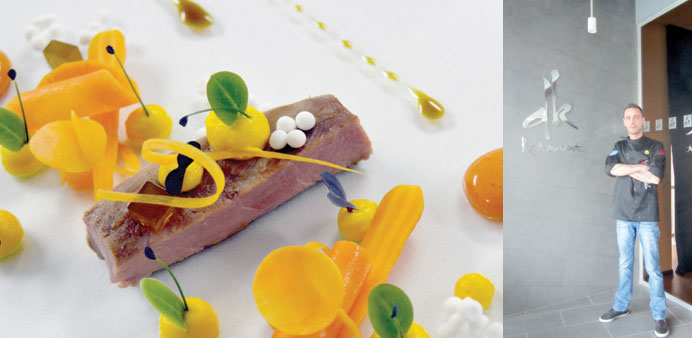By Andreas Stein
David Kikillus is not exactly a fan of the cooks of Ukraine, the country he has chosen for the next step of his international career as a top-echelon chef, but is doing his best to shake them up.
“From a culinary standpoint, the Ukraine does not exist,” the 31-year-old German says dismissively of its food presentation skills.
His gourmet restaurant ‘DK’ in the capital Kiev — the name comprises his initials — is creating its own variations on local dishes.
For example, there’s his menu item ‘Borscht - New Style’ in which the traditional red beet soup is topped with fresh condensed cream cooled by liquid nitrogen. Casually dressed in jeans and a cook’s jacket, Kikillus tells in an interview, “This is all about adding more pep to the local cuisine.”
In the southern part of Kiev, a 22-storey building towers over a new business centre. A hotel opened in the building in June 2012 and it is from here that Kikillus wants to shake up Kiev’s tradition of plain, greasy cooking and big servings.
He has begun spoiling his guests with a six-course menu costing around €130. Such a price is way beyond the means of most people in this impoverished country, but as in other formerly Soviet states, the Ukraine also has its share of super-rich who can afford it.
The modern decor of the DK interior underscores the avant garde ideas of the chef. The glass-walled main dining area can accommodate upwards of 60 guests, while there is a separate more private room where special clients can watch a videocast from the kitchen.
The focus is on creating a culinary experience, something for which Kikillus has already gained a reputation among restaurant critics back in Germany, where he is considered one of the most experimentally minded young top-ranking cooks.
“It wasn’t hard to decide on Kiev,” said Kikillus, a French cuisine specialist who has previously worked in the upmarket Austrian ski resort Kitzbuehel, Spain and Berlin.
Hotel investor Dmitri Buryak met him in London and suggested he create a restaurant from the ground up according to his own wishes. With an offer like that, the German chef was able to turn down bids from China.
“We are pioneers here,” he says of his Kiev restaurant. Nobody else in the city restaurant trade offers anything like his fois gras parfait, his exotic textures or vacuum food preparation techniques. But this is about to change.
After his restaurant’s opening, Kikillus said guests came asking if he could also cook for them in their homes. “We are definitely going to do this too,” he affirmed.
Kiev is supposed to be a modern European metropolis, but getting supplies of spotless fish and vegetables remains problematic.
“I need absolutely top quality, for example tomatoes from Andalusia,” Kikillus said. “With almost every delivery I have to return some of the products.”
His staff of over 40 local employees were given three months of training, in which Kikillus strongly emphasised courteous service and perfect hygiene. There were some language difficulties along the way, he admits.
English, which he mostly uses, is not yet very widespread in the Ukraine, “so I hope to learn some Russian or Ukrainian.”
Not that Kikillus is without any competition. In fact, another German chef, Sebastian Kellerhof, who has won prizes for his Asian dishes, is working in a first-class hotel in Kiev. Kikillus says he has been comparing notes with Kellerhof. “But I want to be number one in Kiev,” he says. – DPA

